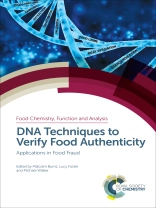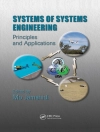The food supply chain needs to reassure consumers and businesses about the safety and standards of food. Global estimates of the cost of food fraud to economies run into billions of dollars hence a huge surge in interest in food authenticity and means of detecting and preventing food fraud and food crime. Approaches targeting DNA markers have assumed a pre-eminence.
This book is the most comprehensive and timely collection of material from those working at the forefront of DNA techniques applied to food authenticity. Addressing the new field of analytical molecular biology as it combines the quality assurance rigour of analytical chemistry with DNA techniques, it introduces the science behind DNA as a target analyte, its extraction, amplification, detection and quantitation as applied to the detection of food fraud and food crime. Making the link with traditional forensic DNA profiling and describing emerging and cutting-edge techniques such as next generation sequencing, this book presents real-world case studies from a wide perspective including from analytical service providers, industry, enforcement agencies and academics. It will appeal to food testing laboratories worldwide, who are just starting to use these techniques and students of molecular biology, food science and food integrity. Food policy professionals and regulatory organisations who will be using these techniques to back up legislation and regulation will find the text invaluable. Those in the food industry in regulatory and technical roles will want to have this book on their desks.
Spis treści
The Role of DNA Analysis in the Determination of Food Authenticity; Forensic DNA – Criminal and Paternity Methods and Applications – How Can This Help in Verifying Food Authenticity?; DNA Extraction from Food Matrices; 'DNA Techniques’ Case Study: Isothermal Approaches; Digital Polymerase Chain Reaction (d PCR) – General Aspects and Applications; UK Food Authenticity Programme – The Analytical Tool Box; Fitness for Purpose of DNA-based Analytical Methods; GMO Detection and Identification Using Next-generation Sequencing; A Perspective on Quantitative DNA Approaches; DNA in Food and Feed Law; Case Studies: Harmonising DNA Methods – The GMO Story; Metrology of DNA Approaches; The Almond and Mahaleb Allergen Story – PCR Resolution of Live Incident Investigations; Food Fraud Prevention – Selecting the Right Test, Method, and Sampling Plan; Meat Speciation; The Horse Meat Scandal – The European Analytical Response; Horse Meat: Technical Appeals and Court Action; Durum Wheat and Pasta Authenticity; The Authenticity of Basmati Rice – A Case Study; Horse Meat: The International Collaborative Trial of the Real-time PCR Method for the Quantitation of Horse DNA; Standardization of DNA-based Methods for Food Authenticity Testing; Authentication of Chinese Traditional Medicine by DNA Analysis; DNA Point of Use Applications; Commercial DNA Testing; EU Food Integrity and Joining up the Landscape (EU Perspective); The Food Authenticity Network; A Vision for the Future
O autorze
The editors possess unrivalled expertise and are keen to describe and foster advances in the key area of DNA techniques applied to food authenticity. Dr Lucy Foster is an experienced food scientist, and head of food research including authenticity research at Defra, for many years commissioning studies of global reach. Dr Malcolm Burns is an internationally recognised molecular biologist and expert in DNA quantitation. Dr Michael Walker was a founder board member of the Food Standards Agency, a subject matter expert to the Elliott Review, is Head of the Office of the Government Chemist, and, with a thriving consulting practice, is an experienced expert witness.












